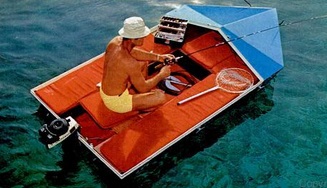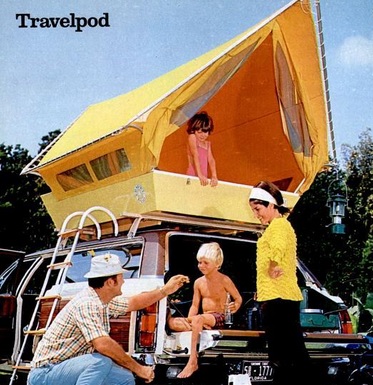

On my “how to make coffee without electricity” page, I’m sometimes asked whether it’s possible to make coffee (or cook other things) with 12 volts. The answer is a qualified yes. There are cooking appliances that run on 12 volts, and for some applications, they can work extremely well. But there are definite limitations, and you can’t expect 12 volts to provide an exact duplicate of your normal cooking experience. Amazon currently has a number of 12 volt appliances on sale, so now is a good time to look at the possibilities and limitations.
The most important thing to remember about cooking with electricity is that producing heat requires a lot of electricity. Sometimes, people look at their toaster, coffee maker, electric heater, or other device and decide that because it is small, it must not use much electricity. This is not the case. As a general rule, any device that creates heat will use a lot of electricity. Therefore, your coffee maker uses more electricity than your television–a lot more. Your toaster uses more electricity than your computer–a lot more. Anything that produces heat will require a lot of electricity.
This means that, in general, you can’t use a battery to do any type of cooking. There is simply not enough energy in the battery. The battery will go dead.
However, if you have 12 volts available from your running vehicle, then you might have some options. But the vehicle will need to be running. Otherwise, you’re very likely to wind up with a dead battery.
For this reason, you’re usually better off using some sort of combustion to do your cooking, such as a gas stove. I have many options available on my coffee page.
But if you want to cook and you have a running vehicle, then 12 volts might be an option, and you should look into the possibilities on this page. For example, if you are a trucker, your truck is running anyway, and there are 12-volt appliances that you can use to cook while the engine is running. Or if you are on the road all day, you can have a cooker plugged in while you are driving.
On the other hand, if you are an RV’er and your rig has a 12-volt battery, that battery is more than adequate to run the lights for a long period of time. However, it is not nearly big enough to run any of the appliances on this page for other than a very short period of time.
Now that we have that out of the way, we need to talk about another limitation. It will take longer to cook food using 12 volts–a lot longer. The amount of heat produced is proportional to the voltage times the current. This means that if a home appliance produces a certain amount of heat in 1 minute, it will take a 12 volt appliance 10 minutes to produce the same amount of heat. The heat will come, eventually, but it will take longer–a lot longer. So if you want instant gratification, you shouldn’t try to cook with 12 volts. But if you’re willing to put in the food and let it cook while you drive around, then you might be interested in the 12 volt appliances shown on this page. Many of these are currently on sale at Amazon, so if you’re in the market, this is a good time to buy.


The first of these appliances is the RoadPro 12-Volt Portable Stove . In this case, the word “stove” is a misnomer. Strictly speaking, this is a stove, because it’s a device used to heat food. But as you can see, it doesn’t look like a stove. It looks more like a tackle box with a 12 volt plug. It doesn’t look like the stove at home, and it doesn’t have the same function as the stove at home. It will slowly cook food as you drive around. Functionally, it will work more like a crock pot or slow cooker. For what it is, it’s very useful, as long as you understand the limitations. It’s great for having a warm meal while you’re driving. You can put the food inside it in the morning, and you will have a hot lunch after driving around for a few hours. But if you expect to quicly cook a meal for your family while camping, it’s a very poor choice.
. In this case, the word “stove” is a misnomer. Strictly speaking, this is a stove, because it’s a device used to heat food. But as you can see, it doesn’t look like a stove. It looks more like a tackle box with a 12 volt plug. It doesn’t look like the stove at home, and it doesn’t have the same function as the stove at home. It will slowly cook food as you drive around. Functionally, it will work more like a crock pot or slow cooker. For what it is, it’s very useful, as long as you understand the limitations. It’s great for having a warm meal while you’re driving. You can put the food inside it in the morning, and you will have a hot lunch after driving around for a few hours. But if you expect to quicly cook a meal for your family while camping, it’s a very poor choice.


If you just want to heat liquids, then the Roadpro Hot Pot is a very economical option. Again, however, you need to understand the limitations. This will not heat nearly as fast as the stove at home. This hot pot will bring 20 ounces of water to a boil in about 35 minutes. Again, if you’re driving around and want to make a hot beverage, this will be great. But remember that once you’ve used the 20 ounces of water, it will take another 35 minutes to make more.
is a very economical option. Again, however, you need to understand the limitations. This will not heat nearly as fast as the stove at home. This hot pot will bring 20 ounces of water to a boil in about 35 minutes. Again, if you’re driving around and want to make a hot beverage, this will be great. But remember that once you’ve used the 20 ounces of water, it will take another 35 minutes to make more.


This 12V Frying Pan is small. It can be used to fy one, or maybe two eggs, or perhaps a hamburger. Even though it can be used to fry food, keep in mind that it will take much longer than the stove at home. Of all of the appliances on the page, this seems to be the least practical, since frying food means that someone needs to keep an eye on it, which you probably can’t do while driving. But perhaps for some uses, it might come in handy, and at the current sale price, it’s economical even for occasional use.
is small. It can be used to fy one, or maybe two eggs, or perhaps a hamburger. Even though it can be used to fry food, keep in mind that it will take much longer than the stove at home. Of all of the appliances on the page, this seems to be the least practical, since frying food means that someone needs to keep an eye on it, which you probably can’t do while driving. But perhaps for some uses, it might come in handy, and at the current sale price, it’s economical even for occasional use.


This 12 volt Sauce Pan and Popcorn Maker suffers from the same limitations. As noted above, it can really only be used while driving, and it would be difficult for the driver to attend to the popping corn.
suffers from the same limitations. As noted above, it can really only be used while driving, and it would be difficult for the driver to attend to the popping corn.
Finally, and probably most useful, is this 12-Volt Coffee Maker  . It will make 3 cups of coffee, although it might take almost an hour to make
. It will make 3 cups of coffee, although it might take almost an hour to make the full amount. So if you like brewed coffee, this is a good option. The carafe is made out of metal, so it will endure a certain amount of abuse in the car. For occasional use during power outages, this might be a good option for those who want brewed coffee. You will need to run your car for the time that it takes to make the coffee. If you had to do that every day, it would be a huge waste of gas. But for occasional use, the convenience might outweigh the added expense.
the full amount. So if you like brewed coffee, this is a good option. The carafe is made out of metal, so it will endure a certain amount of abuse in the car. For occasional use during power outages, this might be a good option for those who want brewed coffee. You will need to run your car for the time that it takes to make the coffee. If you had to do that every day, it would be a huge waste of gas. But for occasional use, the convenience might outweigh the added expense.
 It’s a camper, it’s a boat, and it’s a car top luggage carrier, all in one. The author must have built two of them, since the yellow one is shown on top of the station wagon, and the blue one is shown in the water. Complete plans were available from the publisher, and you could even get custom decals for an additional 50 cents.
It’s a camper, it’s a boat, and it’s a car top luggage carrier, all in one. The author must have built two of them, since the yellow one is shown on top of the station wagon, and the blue one is shown in the water. Complete plans were available from the publisher, and you could even get custom decals for an additional 50 cents.![]()








